Bow Valley College-MGMT1601 Employment Law: Case Study Analysis
VerifiedAdded on 2023/06/10
|7
|962
|319
Report
AI Summary
This employment law assignment presents a series of case studies focusing on discrimination and human rights violations within the workplace. The cases cover issues such as discrimination against visible minorities, marital and family status discrimination, nationality-based discrimination, discriminatory job requirements, religious coercion, sexual harassment, and denial of access to public spaces for individuals with disabilities. Each case is analyzed in relation to relevant Canadian laws, including the Employment Equity Act, the Canadian Human Rights Act, the Human Rights Code, and the Blind Person’s Rights Act. The assignment identifies the legal violations in each scenario and suggests potential avenues for redress, such as lodging complaints with the Human Rights Tribunal or reporting incidents to the police. The document concludes by referencing all the statutes and acts referred to in the solution.
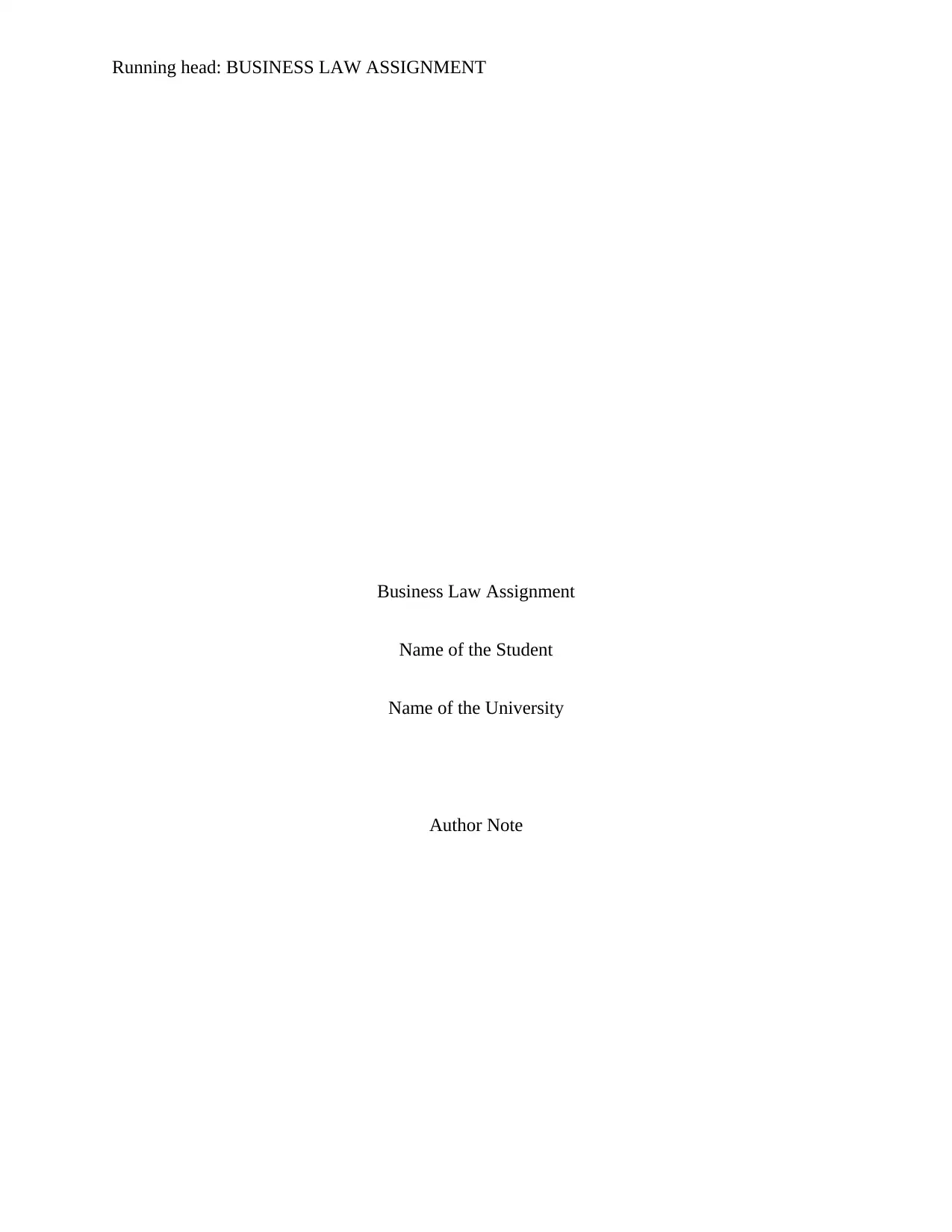
Running head: BUSINESS LAW ASSIGNMENT
Business Law Assignment
Name of the Student
Name of the University
Author Note
Business Law Assignment
Name of the Student
Name of the University
Author Note
Paraphrase This Document
Need a fresh take? Get an instant paraphrase of this document with our AI Paraphraser
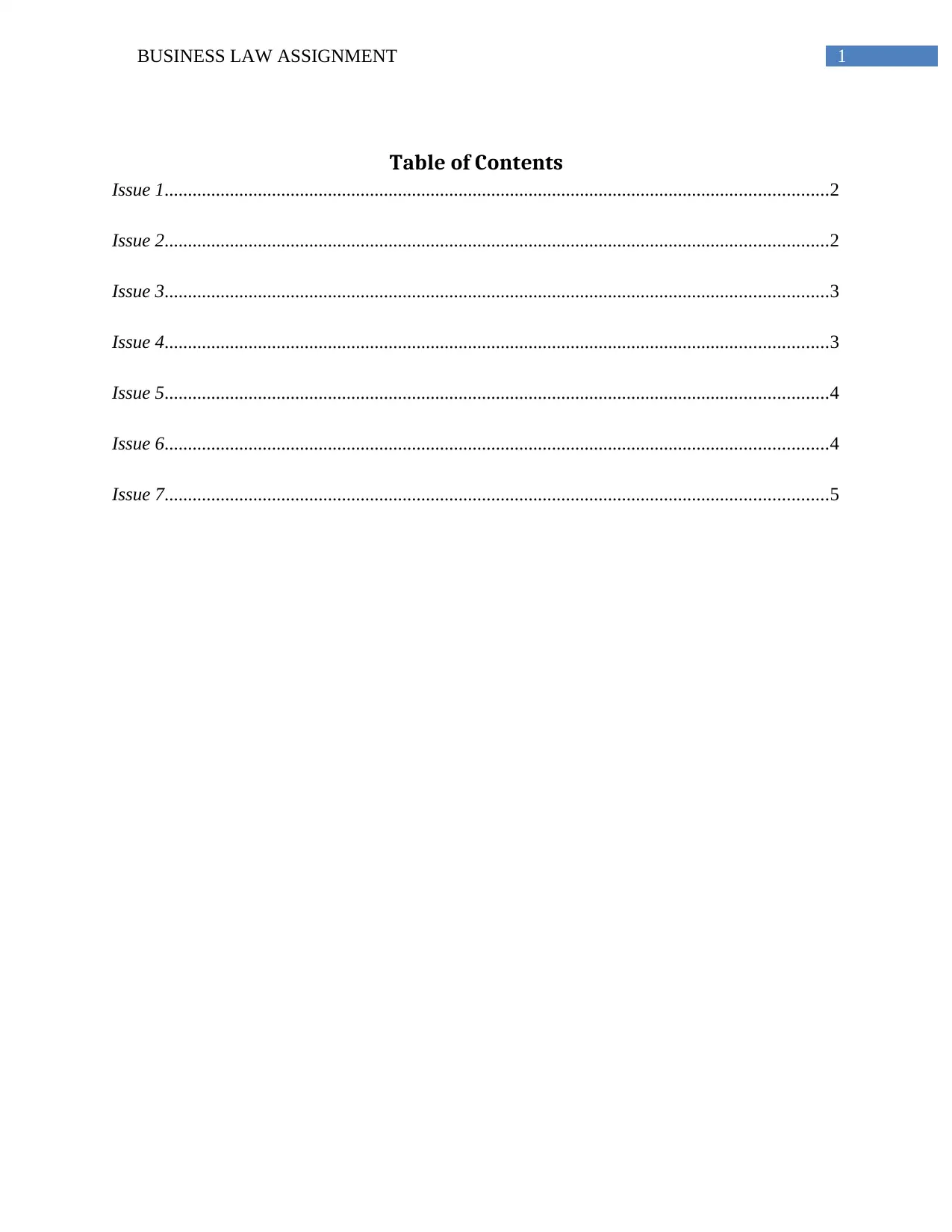
1BUSINESS LAW ASSIGNMENT
Table of Contents
Issue 1..............................................................................................................................................2
Issue 2..............................................................................................................................................2
Issue 3..............................................................................................................................................3
Issue 4..............................................................................................................................................3
Issue 5..............................................................................................................................................4
Issue 6..............................................................................................................................................4
Issue 7..............................................................................................................................................5
Table of Contents
Issue 1..............................................................................................................................................2
Issue 2..............................................................................................................................................2
Issue 3..............................................................................................................................................3
Issue 4..............................................................................................................................................3
Issue 5..............................................................................................................................................4
Issue 6..............................................................................................................................................4
Issue 7..............................................................................................................................................5
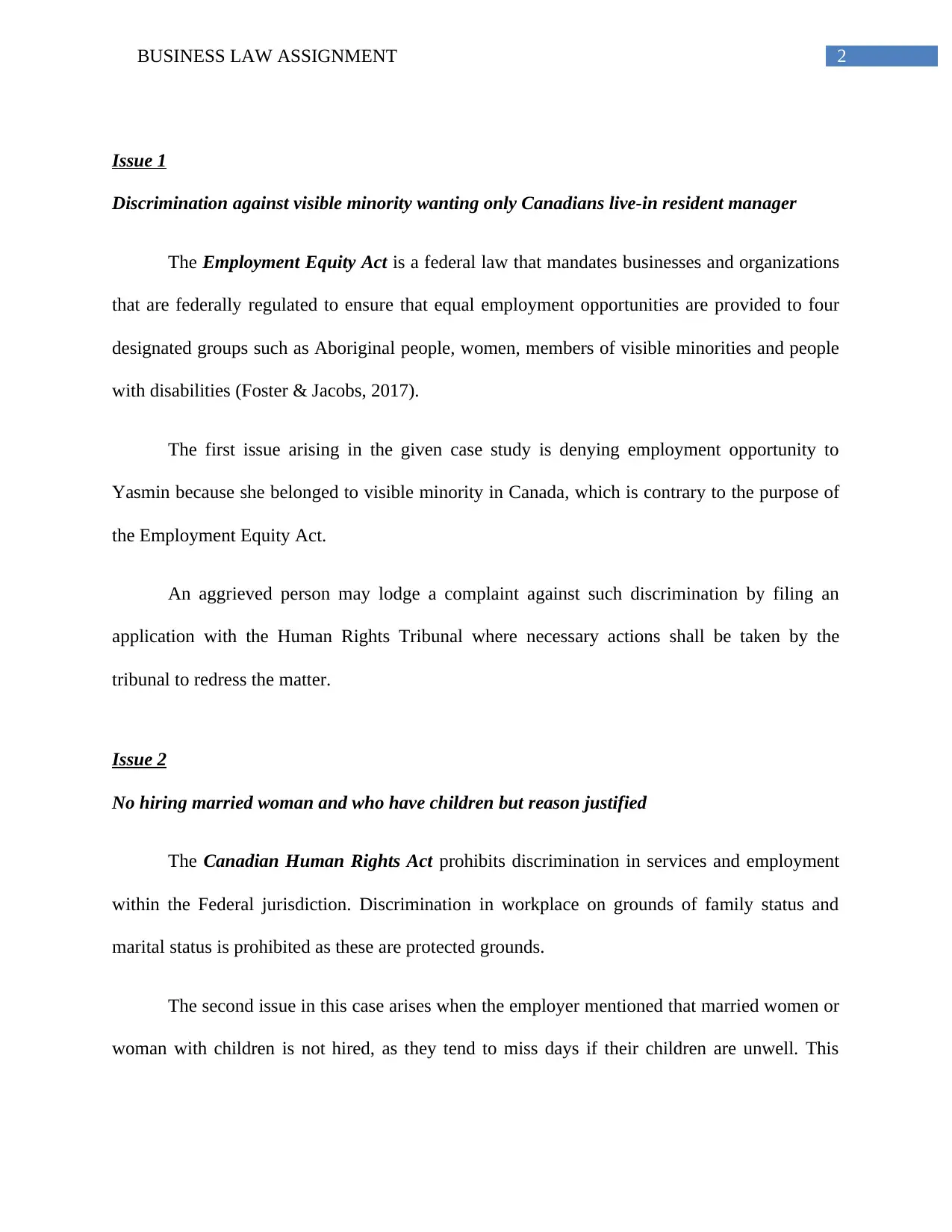
2BUSINESS LAW ASSIGNMENT
Issue 1
Discrimination against visible minority wanting only Canadians live-in resident manager
The Employment Equity Act is a federal law that mandates businesses and organizations
that are federally regulated to ensure that equal employment opportunities are provided to four
designated groups such as Aboriginal people, women, members of visible minorities and people
with disabilities (Foster & Jacobs, 2017).
The first issue arising in the given case study is denying employment opportunity to
Yasmin because she belonged to visible minority in Canada, which is contrary to the purpose of
the Employment Equity Act.
An aggrieved person may lodge a complaint against such discrimination by filing an
application with the Human Rights Tribunal where necessary actions shall be taken by the
tribunal to redress the matter.
Issue 2
No hiring married woman and who have children but reason justified
The Canadian Human Rights Act prohibits discrimination in services and employment
within the Federal jurisdiction. Discrimination in workplace on grounds of family status and
marital status is prohibited as these are protected grounds.
The second issue in this case arises when the employer mentioned that married women or
woman with children is not hired, as they tend to miss days if their children are unwell. This
Issue 1
Discrimination against visible minority wanting only Canadians live-in resident manager
The Employment Equity Act is a federal law that mandates businesses and organizations
that are federally regulated to ensure that equal employment opportunities are provided to four
designated groups such as Aboriginal people, women, members of visible minorities and people
with disabilities (Foster & Jacobs, 2017).
The first issue arising in the given case study is denying employment opportunity to
Yasmin because she belonged to visible minority in Canada, which is contrary to the purpose of
the Employment Equity Act.
An aggrieved person may lodge a complaint against such discrimination by filing an
application with the Human Rights Tribunal where necessary actions shall be taken by the
tribunal to redress the matter.
Issue 2
No hiring married woman and who have children but reason justified
The Canadian Human Rights Act prohibits discrimination in services and employment
within the Federal jurisdiction. Discrimination in workplace on grounds of family status and
marital status is prohibited as these are protected grounds.
The second issue in this case arises when the employer mentioned that married women or
woman with children is not hired, as they tend to miss days if their children are unwell. This
⊘ This is a preview!⊘
Do you want full access?
Subscribe today to unlock all pages.

Trusted by 1+ million students worldwide
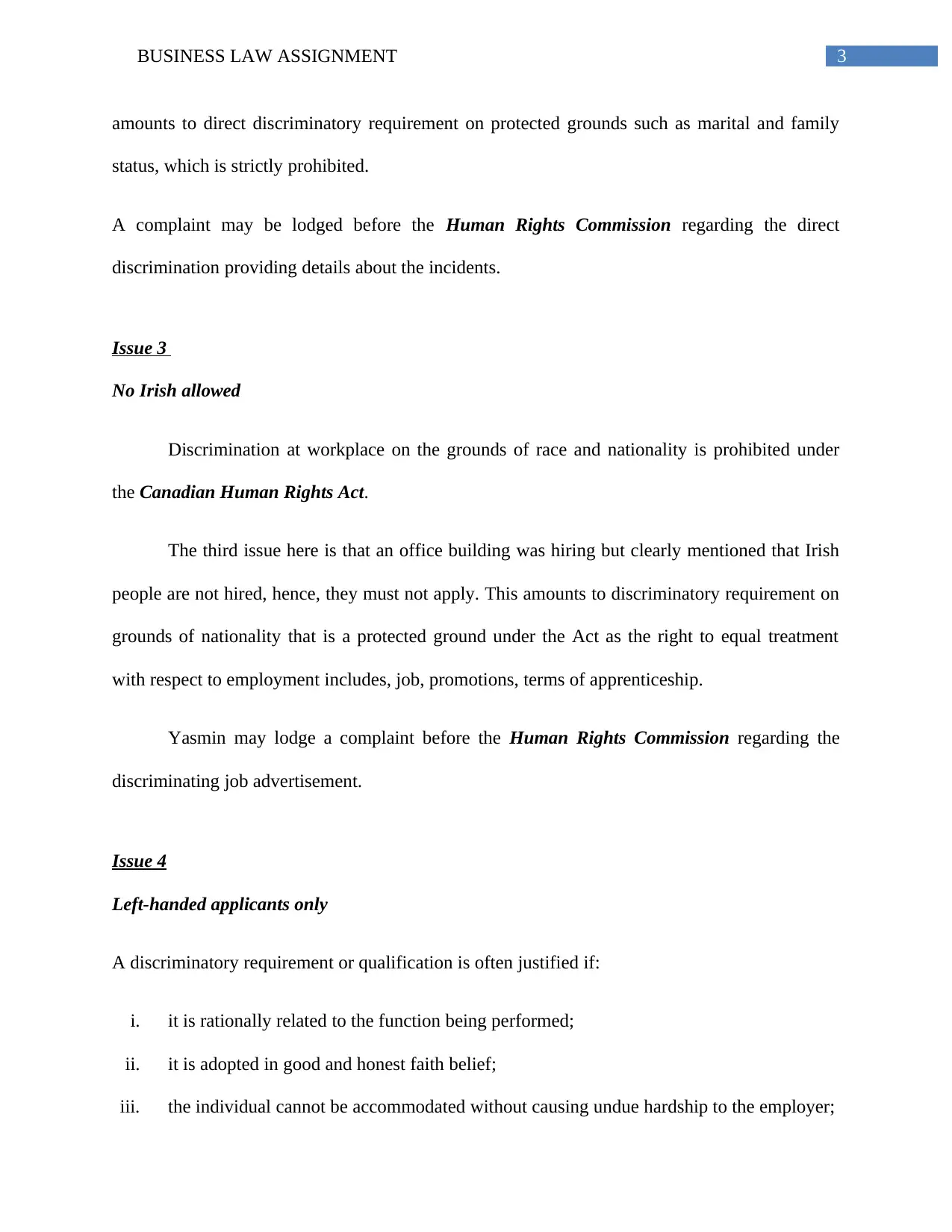
3BUSINESS LAW ASSIGNMENT
amounts to direct discriminatory requirement on protected grounds such as marital and family
status, which is strictly prohibited.
A complaint may be lodged before the Human Rights Commission regarding the direct
discrimination providing details about the incidents.
Issue 3
No Irish allowed
Discrimination at workplace on the grounds of race and nationality is prohibited under
the Canadian Human Rights Act.
The third issue here is that an office building was hiring but clearly mentioned that Irish
people are not hired, hence, they must not apply. This amounts to discriminatory requirement on
grounds of nationality that is a protected ground under the Act as the right to equal treatment
with respect to employment includes, job, promotions, terms of apprenticeship.
Yasmin may lodge a complaint before the Human Rights Commission regarding the
discriminating job advertisement.
Issue 4
Left-handed applicants only
A discriminatory requirement or qualification is often justified if:
i. it is rationally related to the function being performed;
ii. it is adopted in good and honest faith belief;
iii. the individual cannot be accommodated without causing undue hardship to the employer;
amounts to direct discriminatory requirement on protected grounds such as marital and family
status, which is strictly prohibited.
A complaint may be lodged before the Human Rights Commission regarding the direct
discrimination providing details about the incidents.
Issue 3
No Irish allowed
Discrimination at workplace on the grounds of race and nationality is prohibited under
the Canadian Human Rights Act.
The third issue here is that an office building was hiring but clearly mentioned that Irish
people are not hired, hence, they must not apply. This amounts to discriminatory requirement on
grounds of nationality that is a protected ground under the Act as the right to equal treatment
with respect to employment includes, job, promotions, terms of apprenticeship.
Yasmin may lodge a complaint before the Human Rights Commission regarding the
discriminating job advertisement.
Issue 4
Left-handed applicants only
A discriminatory requirement or qualification is often justified if:
i. it is rationally related to the function being performed;
ii. it is adopted in good and honest faith belief;
iii. the individual cannot be accommodated without causing undue hardship to the employer;
Paraphrase This Document
Need a fresh take? Get an instant paraphrase of this document with our AI Paraphraser
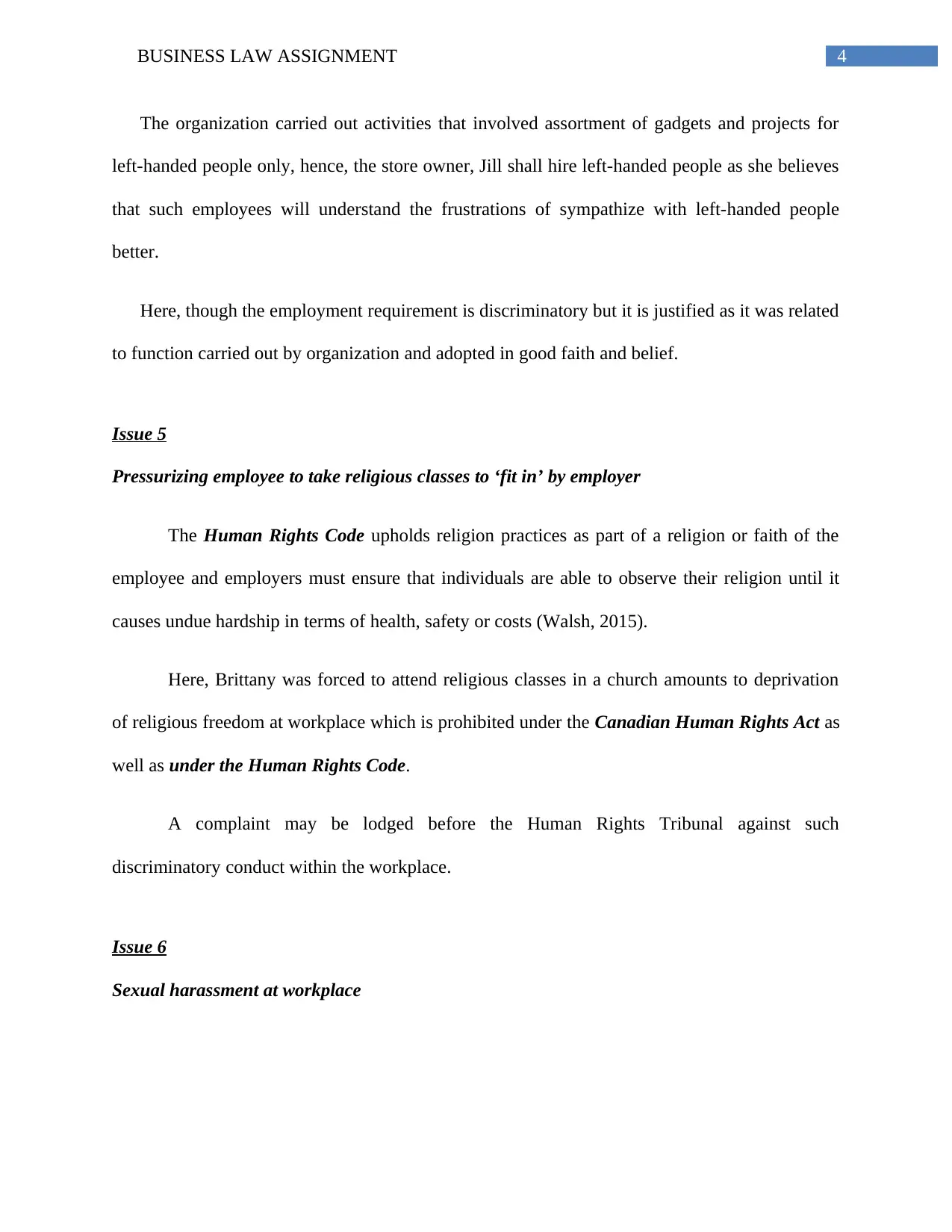
4BUSINESS LAW ASSIGNMENT
The organization carried out activities that involved assortment of gadgets and projects for
left-handed people only, hence, the store owner, Jill shall hire left-handed people as she believes
that such employees will understand the frustrations of sympathize with left-handed people
better.
Here, though the employment requirement is discriminatory but it is justified as it was related
to function carried out by organization and adopted in good faith and belief.
Issue 5
Pressurizing employee to take religious classes to ‘fit in’ by employer
The Human Rights Code upholds religion practices as part of a religion or faith of the
employee and employers must ensure that individuals are able to observe their religion until it
causes undue hardship in terms of health, safety or costs (Walsh, 2015).
Here, Brittany was forced to attend religious classes in a church amounts to deprivation
of religious freedom at workplace which is prohibited under the Canadian Human Rights Act as
well as under the Human Rights Code.
A complaint may be lodged before the Human Rights Tribunal against such
discriminatory conduct within the workplace.
Issue 6
Sexual harassment at workplace
The organization carried out activities that involved assortment of gadgets and projects for
left-handed people only, hence, the store owner, Jill shall hire left-handed people as she believes
that such employees will understand the frustrations of sympathize with left-handed people
better.
Here, though the employment requirement is discriminatory but it is justified as it was related
to function carried out by organization and adopted in good faith and belief.
Issue 5
Pressurizing employee to take religious classes to ‘fit in’ by employer
The Human Rights Code upholds religion practices as part of a religion or faith of the
employee and employers must ensure that individuals are able to observe their religion until it
causes undue hardship in terms of health, safety or costs (Walsh, 2015).
Here, Brittany was forced to attend religious classes in a church amounts to deprivation
of religious freedom at workplace which is prohibited under the Canadian Human Rights Act as
well as under the Human Rights Code.
A complaint may be lodged before the Human Rights Tribunal against such
discriminatory conduct within the workplace.
Issue 6
Sexual harassment at workplace
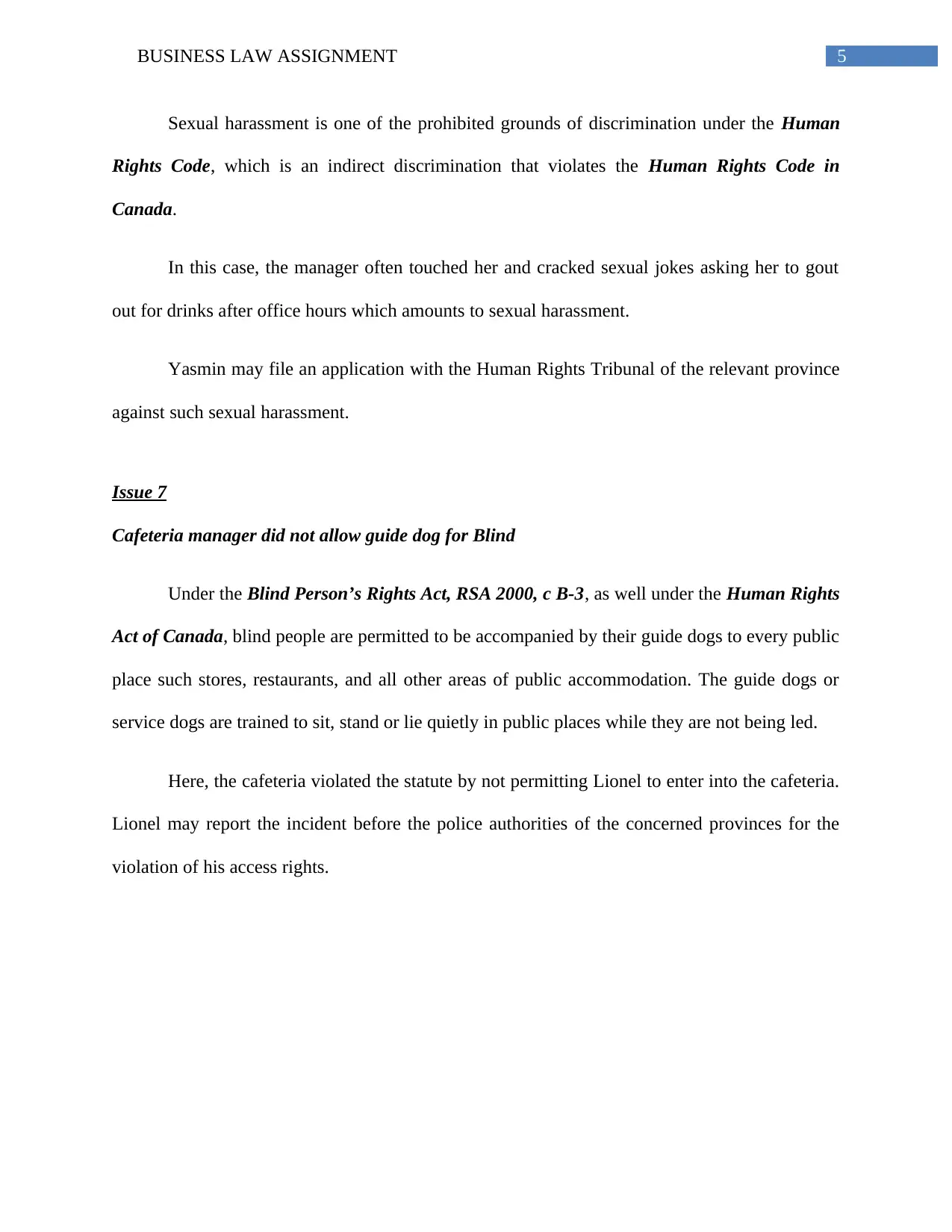
5BUSINESS LAW ASSIGNMENT
Sexual harassment is one of the prohibited grounds of discrimination under the Human
Rights Code, which is an indirect discrimination that violates the Human Rights Code in
Canada.
In this case, the manager often touched her and cracked sexual jokes asking her to gout
out for drinks after office hours which amounts to sexual harassment.
Yasmin may file an application with the Human Rights Tribunal of the relevant province
against such sexual harassment.
Issue 7
Cafeteria manager did not allow guide dog for Blind
Under the Blind Person’s Rights Act, RSA 2000, c B-3, as well under the Human Rights
Act of Canada, blind people are permitted to be accompanied by their guide dogs to every public
place such stores, restaurants, and all other areas of public accommodation. The guide dogs or
service dogs are trained to sit, stand or lie quietly in public places while they are not being led.
Here, the cafeteria violated the statute by not permitting Lionel to enter into the cafeteria.
Lionel may report the incident before the police authorities of the concerned provinces for the
violation of his access rights.
Sexual harassment is one of the prohibited grounds of discrimination under the Human
Rights Code, which is an indirect discrimination that violates the Human Rights Code in
Canada.
In this case, the manager often touched her and cracked sexual jokes asking her to gout
out for drinks after office hours which amounts to sexual harassment.
Yasmin may file an application with the Human Rights Tribunal of the relevant province
against such sexual harassment.
Issue 7
Cafeteria manager did not allow guide dog for Blind
Under the Blind Person’s Rights Act, RSA 2000, c B-3, as well under the Human Rights
Act of Canada, blind people are permitted to be accompanied by their guide dogs to every public
place such stores, restaurants, and all other areas of public accommodation. The guide dogs or
service dogs are trained to sit, stand or lie quietly in public places while they are not being led.
Here, the cafeteria violated the statute by not permitting Lionel to enter into the cafeteria.
Lionel may report the incident before the police authorities of the concerned provinces for the
violation of his access rights.
⊘ This is a preview!⊘
Do you want full access?
Subscribe today to unlock all pages.

Trusted by 1+ million students worldwide
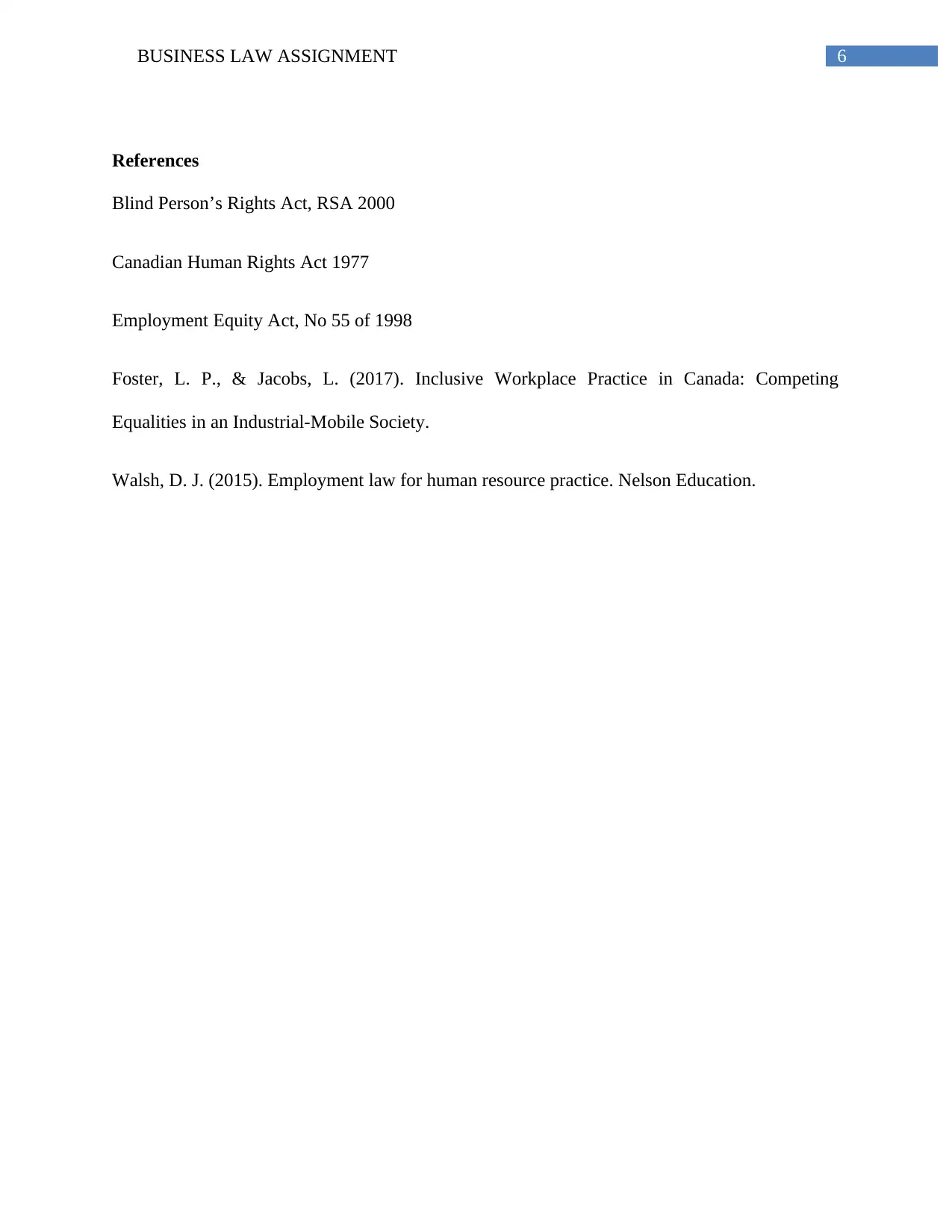
6BUSINESS LAW ASSIGNMENT
References
Blind Person’s Rights Act, RSA 2000
Canadian Human Rights Act 1977
Employment Equity Act, No 55 of 1998
Foster, L. P., & Jacobs, L. (2017). Inclusive Workplace Practice in Canada: Competing
Equalities in an Industrial-Mobile Society.
Walsh, D. J. (2015). Employment law for human resource practice. Nelson Education.
References
Blind Person’s Rights Act, RSA 2000
Canadian Human Rights Act 1977
Employment Equity Act, No 55 of 1998
Foster, L. P., & Jacobs, L. (2017). Inclusive Workplace Practice in Canada: Competing
Equalities in an Industrial-Mobile Society.
Walsh, D. J. (2015). Employment law for human resource practice. Nelson Education.
1 out of 7
Related Documents
Your All-in-One AI-Powered Toolkit for Academic Success.
+13062052269
info@desklib.com
Available 24*7 on WhatsApp / Email
![[object Object]](/_next/static/media/star-bottom.7253800d.svg)
Unlock your academic potential
Copyright © 2020–2026 A2Z Services. All Rights Reserved. Developed and managed by ZUCOL.





